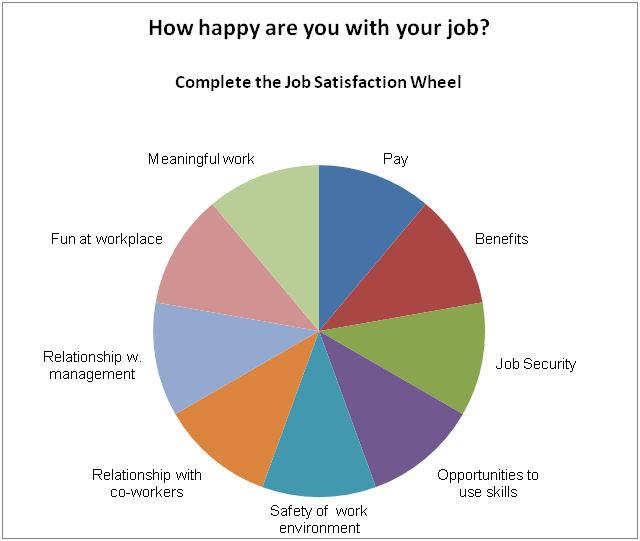What are the key factors that keep people happy in the workplace?
One would assume that this should be an easy question to research, however studies about this topic yield different results. For one, researchers use different questions in their surveys.  Another reason is that not all studies analyze the results by age groups. Generally, younger workers tend to be less satisfied with their jobs than older workers and they do have different expectations.
The Society for Human Resource Management (SHRM) annually surveys employees and HR professionals about job satisfaction.
The Top 5 Job Satisfaction Factors for Employees are according to the 2009 Survey report :
- Job Security
- Benefits
- Compensation/Pay
- Opportunities to use skills and abilities
- Feeling safe in the work environment
The HR professionals in this study agreed with ‘ Job Security’ as top priority, and they also included ‘Benefit’s and ‘Opportunities to use skills and abilities’ among the top 5 factors. However, on rank 2 they put ‘Relationship with immediate supervisor’ and on rank 4’Ccommunication between employees and senior managemen’t.
Salary.com Inc.  found that employers overestimate the job satisfaction levels of their employees.  According to the 2008/2009 Employee Satisfaction and Retention Survey by salary.com, about 65 % of employees said that they are somewhat satisfied with their jobs. Employers believed this number to be 77%.  
Key Factors for staying in the job are according to the study: 
Good relationships with co-workers,  job security, desirable commute and desirable hours.  Good relationships with managers and adequate benefitswhere this time not among the top reasons why people remain in their jobs.
Top reasons to leave a job are according to the survey inadequate pay, insufficient recognition and not  enough development opportunities.
In my college classes, I usually give my students also a questionnaire about important job satisfaction factors. Most of my students are in their 20s, which means they belong to the group of the most unhappy workers in the US Рat least according to the results of most  major surveys.
The top 5 key factors for job satisfaction according to my students are:
- Pay
- Benefits
- Relationship with supervisor
- Relationship with co-workers                              and, normally not included in surveys
- Humor/ having fun at the workplace
Perhaps this is the difference between todays young people and the rest of us workers. Young people want to enjoy the time they spend at work, while previous generations are more achievement oriented or only work to make a living.
Why do you work? What are the most important key factors for you? What motivates you? What can you do to improve a dissatisfying job?
Find the answers in my new eWorkbook: Job Satisfaction – Learn to Love Your Job!

This is not just another book to read. Activities like thought questions, questionnaires and exercises will guide you to a better understanding of your wishes and needs at the workplace. You will learn which aspects of your job are gratifying and which aspects need improvement. I also offer you advice and tips what you can do to improve your job situation.
Get the eWorkbook ¬†“Job Satisfaction – Learn to Love Your Job”¬† NOW!

 1 Comment
1 Comment 

